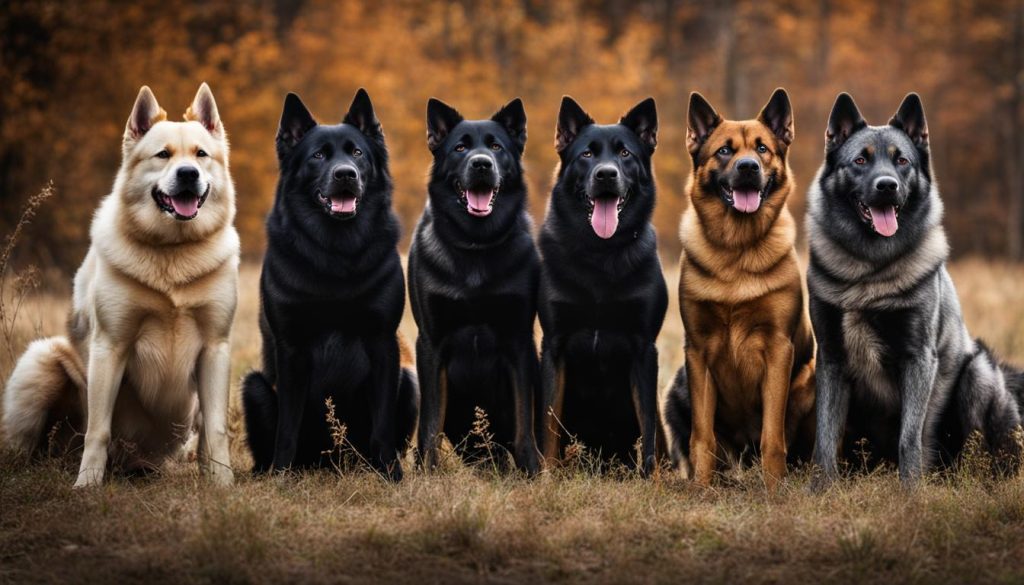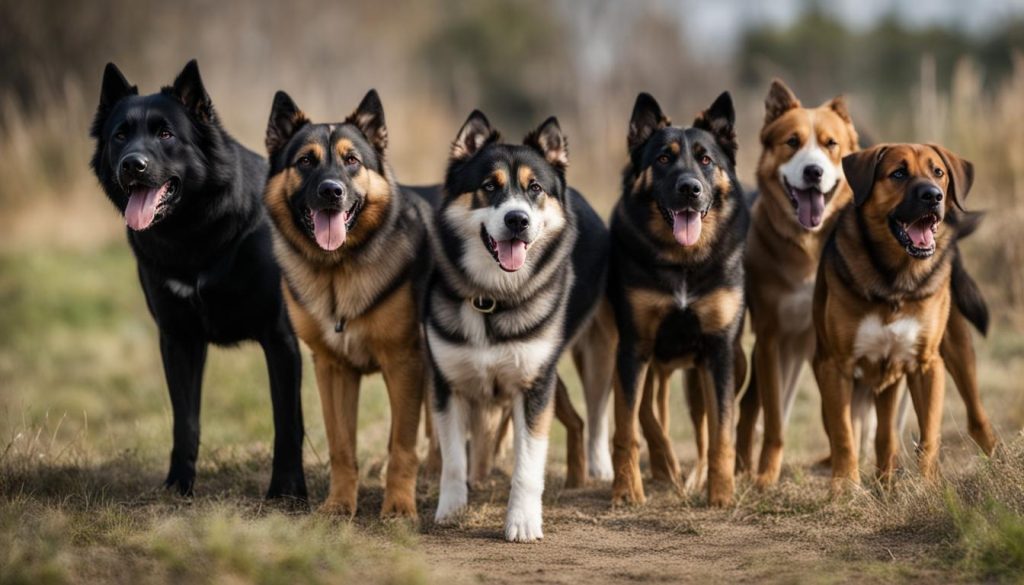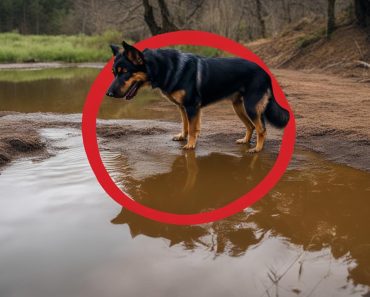Aggression in dogs has been a topic surrounded by misconceptions for years. As a responsible dog owner, it is important to understand which breeds are often labeled as aggressive. While aggression cannot be solely attributed to breed, certain dogs may have a higher tendency for aggression towards other dogs. The breeds commonly associated with this behavior include American Bulldogs, American Pit Bull Terriers, and American Staffordshire Terriers.
It is crucial to note that individual variation exists within each breed, and not all dogs of these breeds will exhibit aggressive behavior. Breed does not determine a dog’s nature; rather, factors such as an owner’s behavior and training methods play a significant role in shaping their behavior.
Debunking Myths About Aggressive Dog Breeds
There are numerous myths surrounding aggressive dog breeds that need to be debunked. One prevailing myth is that all Pit Bulls are inherently aggressive. However, as a professional dog trainer, I can confidently say that responsible ownership, socialization, and proper training play a significant role in shaping a dog’s behavior, regardless of their breed. Aggression in dogs is not solely determined by their genetic predisposition; an owner’s behavior and training methods are crucial factors in determining a dog’s aggression levels.
It is essential to approach aggressive dog behavior with empathy and understanding. By providing consistent boundaries, positive reinforcement, and early socialization, many dogs can learn to manage their aggressive tendencies effectively. The key lies in recognizing the underlying causes of aggression and addressing them through appropriate training methods. Contrary to popular belief, aggressive dogs can learn to become calm, well-balanced companions with the right guidance and support.
If you are dealing with an aggressive dog, it is crucial to seek professional guidance from a qualified dog trainer or behaviorist. They have the expertise and experience to assess your dog’s behavior accurately and provide effective training strategies to manage their aggression. With their help, you can create a safe and harmonious environment for both your dog and those around them.
Factors Influencing Aggression in Dogs
When it comes to understanding aggression in dogs, it’s important to recognize that breed alone is not the sole determinant. While certain breeds have a reputation for being more aggressive than others, factors such as an owner’s behavior, training methods, and the dog’s upbringing all play a significant role in shaping their behavior.
Research suggests that aggression levels in dogs can be influenced by various factors. For instance, dogs from reputable breeders who prioritize proper socialization and early training tend to have lower aggression levels. On the other hand, dogs from rescue centers, who may have had a turbulent past, could exhibit higher aggression levels due to past experiences or lack of proper care.
It’s crucial to note that early training, socialization, and proper care are essential for all dog breeds, regardless of their aggression tendencies. This means that responsible dog ownership and providing a safe and nurturing environment are vital in preventing and managing aggression in dogs. By understanding and addressing these contributing factors, we can work towards fostering healthier and happier relationships with our canine companions.

Key Takeaways
Factors influencing aggression in dogs:
- Owner’s behavior and training methods
- Breeder or rescue center source
- Early training and socialization
- Proper care and nurturing environment
By considering these factors and prioritizing responsible dog ownership, we can help create a safer and more harmonious environment for both dogs and their families.
Understanding Aggression in Specific Breeds
When it comes to aggression in dogs, it is essential to recognize that each breed has its own unique characteristics and tendencies. While it is crucial not to generalize an entire breed based on these traits, it is important to have an understanding of the general tendencies of certain breeds when considering dog ownership. In this section, we will explore the aggression levels in specific breeds, providing insights into their typical behavior.
Aggressive Dog Breeds
Three breeds often associated with aggression are American Bulldogs, American Pit Bull Terriers, and American Staffordshire Terriers. It is important to note that while these breeds have gained a reputation for aggressiveness, individual dogs within these breeds can exhibit a wide range of behaviors. Proper training, socialization, and responsible ownership play a significant role in shaping a dog’s behavior, regardless of its breed.
On the other end of the spectrum, breeds such as Golden Retrievers, Labrador Retrievers, and Scenthounds are generally known for their friendly and sociable nature and are considered among the least aggressive breeds. However, it is crucial to understand that individual variation exists within each breed, and early socialization and training are still essential for their overall behavior and well-being.

When considering a dog breed, it is important to remember that generalizations based on breed tendencies should not be the sole determining factor. Each dog should be evaluated on an individual basis, taking into account its upbringing, training, and socialization. By understanding the potential for aggression in specific breeds and providing proper care and training, we can ensure a harmonious and safe relationship between dogs and their families.
Managing Aggression in Dogs
When it comes to managing aggression in dogs, responsible ownership, early socialization, and proper training are key. It is important to remember that aggression should not be solely attributed to breed, as all dogs have the potential for aggressive behavior if not properly managed. Understanding a dog’s individual needs and providing appropriate mental and physical stimulation are crucial steps in addressing and managing aggression.
One important aspect of managing aggression is responsible ownership. This includes providing a safe and secure environment for your dog, ensuring they have a balanced diet, regular exercise, and access to proper veterinary care. It is also crucial to establish yourself as the pack leader through positive reinforcement training techniques. Consistency, patience, and clear communication with your dog are essential in establishing a trusting and respectful relationship.
Seeking professional help is another important step in managing aggression. If your dog displays concerning levels of aggression, it is advisable to consult with a professional dog trainer or behaviorist. They can assess your dog’s behavior, provide expert guidance, and help tailor a training plan specifically for your dog’s needs. With their guidance, you can implement appropriate techniques to manage and modify your dog’s aggressive behavior.
Promoting Responsible Dog Ownership
As a responsible dog owner, I believe that promoting responsible dog ownership is crucial in preventing and managing aggression in dogs. It starts with understanding the different breeds and their tendencies, including those on the aggressive dog breeds list.
Proper training and socialization are key factors in ensuring a dog’s well-being. By investing time and effort into training, we can help our furry friends develop good behavior and better manage their temperament. Additionally, early socialization with other dogs and people can help prevent fear-based aggression.
Meeting a dog’s physical and mental needs is equally important. Regular exercise, mental stimulation, and providing a safe and secure environment are vital in keeping dogs happy and balanced. A tired and fulfilled dog is less likely to exhibit aggressive behavior.
By treating each dog as an individual and understanding that aggression is influenced by various factors, we can create a safer and more understanding environment for both dogs and their owners. Responsible dog ownership means being committed to ongoing education and seeking professional help when needed. Together, we can ensure that all dogs have the opportunity to thrive and be valued members of our families.
FAQ
Are certain dog breeds more likely to be aggressive?
While certain breeds have been identified as more likely to display aggression towards other dogs, it is important to note that individual variation exists within each breed, and not all dogs of these breeds will exhibit aggressive behavior.
Are all Pit Bulls inherently aggressive?
No, responsible ownership, socialization, and proper training play a significant role in shaping a dog’s behavior, regardless of their breed. It is important not to generalize an entire breed based on the behavior of some individuals.
What factors contribute to a dog’s aggression?
Numerous factors contribute to a dog’s behavior and aggression, including an owner’s behavior, training methods, and the dog’s genetic makeup and upbringing. It is important to consider more than just breed when assessing a dog’s potential for aggression.
Which breeds are considered the least aggressive?
Breeds such as Golden Retrievers, Labrador Retrievers, and Scenthounds are generally known for their friendly and sociable nature and are considered among the least aggressive breeds. However, individual variation exists within each breed, and proper training and socialization are still important for their overall behavior and well-being.
How can aggression in dogs be managed?
Managing aggression in dogs requires a multifaceted approach that includes responsible ownership, early socialization, proper training, and seeking professional help when necessary. Understanding a dog’s individual needs and providing mental and physical stimulation are also important steps in addressing and managing aggressive behavior.
What can I do to promote responsible dog ownership?
Promoting responsible dog ownership involves careful consideration of a dog’s breed tendencies, providing proper training and socialization, meeting their physical and mental needs, and ensuring a safe and secure environment. By promoting responsible dog ownership, we can create a safer and more understanding environment for both dogs and their owners.






